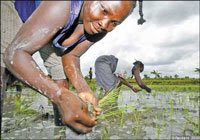 By JULIA DAY, STEPS Centre member
By JULIA DAY, STEPS Centre member
The UN World Food Summit opened in Rome today, aiming to address the soaring food costs which have sparked riots in Egypt, Cameroon, Cote d‘Ivoire, Senegal, Burkina Faso and Madagascar. The press are filing plenty of copy on the issue (and not just about Mugabe’s prescence in the Italian capital). And already this morning Secretary General Ban Ki-moon has called for nations to minimize export restrictions and import tariffs. But are the options on the table in Rome sustainable and in the best interests of the people at the sharp end of the crisis? Photo credit: Reuters
The recent ‘Towards a Green Revolution in Africa’ conference, co-hosted by STEPS affiliate Future Agricultures Consortium in Salzburg, saw former UN Secretary General Kofi Annan, in his role as chairman of the Alliance for a Green Revolution in Africa (AGRA), add his thoughts to a new vision for African agriculture.
The event began on the premise that there is a clear need for a new vision for agricultural development in Africa that can deal with the complexities of agriculture in diverse settings across Africa and meet the conditions necessary to achieve more equitable benefits for Africa’s farmers.
But the 90-plus delegates, largely from African countries, asked tough questions about whose vision should this be? How can complexity and diversity be dealt with? What can be learned from the impacts – positive and negative – of the “green revolutions” in Latin America and Asia? And how best to move forward?
Among the central issues pin-pointed by delegates for a sustainable, uniquely Green Revolution in Africa were that farmers and their needs must be placed at epicentre; that gender and ethnicity issues are taken into account; that smallholders and those farmers who are consumers, and not just producers, of food have a voice in farmer organisations.
The quality and reach of data and information on crop productivity and prices is curcial, the conference agreed, as is the need to extend the debate beyond staple crops. Livestock needs to be put centre stage, with the importance of smallstock and poultry production to poorer people and women in particular, acknowledged.
How much the Ministers sitting down in Rome this morning have a sustainable future food supply for world’s poor and marginalised peoples at the forefront of thier minds remains to be seen.
All blogs from the Salzburg event
Some of today’s key media coverage on the UN food crisis summit:
Seeds of change: Africa seeks to engineer an agricultural revolution
The end of abundance: Food panic brings calls for a second ‘green revolution’
EU food chief: Lift BSE ban to cut grain prices